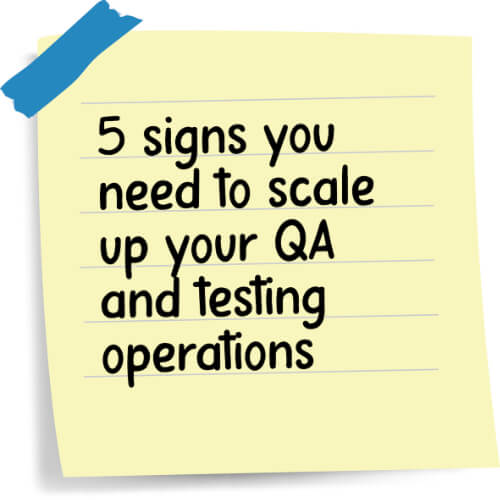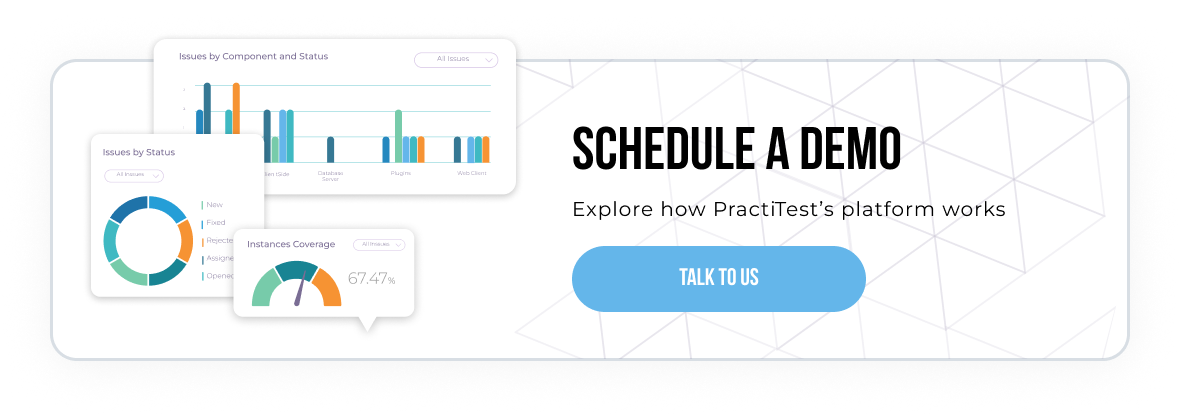Software is a fundamental element in our daily lives, and growing in presence, with more and more industries going through digital transformation. At the same time, customers expect to receive a flawless user experience, so it is no surprise that almost all companies understand the necessity of performing proper testing and Quality Assurance (QA) activities. The common first step is to hire a team of QAs or assign this responsibility to a member of the IT department. This is a good starting point, but hiring a team, or assigning responsibility is only the beginning.
Then, depending on the organization's size and complexity, we see a range of testing activities that are being performed, using different methodologies, from tools adoption, team sizes, locations, and automation adoption.
In this article, we are going to present 5 signs that will inform you that the time has come to scale up your QA and testing operations.

1. You Are Not Been Appreciated For The Work You Do
Testing is a critical part of any company's success, but too often, it is taken for granted, and QA professionals are only called on when a crisis occurs and there is a need to look for who to blame. This unfortunate situation, although not unique to testing only, doesn’t mean you need to improve your work quality but, to improve its visibility and to bring your work “into the table” when decisions need to be made. The easiest way to do this is to be able to provide proper but easy-to-digest, reports and dashboards of your activities, that allow the relevant stakeholders to quickly understand the current state without the need to login into multiple systems. If you are unable to do so at the moment, it is a sign it's time to scale up.
2. You Work Globally And Remotely
When your entire team is working in one physical location, managing your testing operations can be relatively easy, as unclear issues can be solved simply by riding one floor up or down the elevator and asking the relevant person for explanations. However, that solution becomes irrelevant when working in globally distributed teams, offshoring or onshoring, or, when working remotely, as so many of us have found ourselves doing during the Covid pandemic for the first time. Going global can be a sign that your business is growing, which is always a great sign it's time to scale up.
3. You Are Using Multiple Testing Types
10 years ago, when the word testing was said, it was pretty straightforward that the speaker was referring to scripted testing, performed by a human being. The testing landscape nowadays is much more complex, and it incorporates in most cases, somewhere between 3-6 automation tools, exploratory testing, in addition to the “traditional” scripted testing. This phenomenon, with the benefits it brings, also created an unlimited amount of challenges that relate to the ability to manage information from all of these separate channels, in a non-siloed manner, that enables creating meaningful insights out of the performed testing activities. This is again a sign that you need to scale up your testing operations.

4. You Adopt Agile/DevOps Methodologies
The introduction of Agile and DevOps has created a demand for shorter cycles, but this doesn't mean that quality requirements were lowered, on the contrary. Now you are tasked with testing faster than ever before, and more often than not, you are now an integral part of an agile team, that is using various other tools in their day-to-day operations. This means that your testing operations must be much smarter than before so you can act as the leading testing function within your existing agile teams, and coordinate testing activities with other teams who are performing testing in parallel.
5. You Work In A Regulated Industry
Most companies are required to comply with some regulatory requirements such as the GDPR requirements that relate to users’ right to privacy, and the CAN-SPAM law, which sets the rules for commercial email, establishes requirements for commercial messages, gives recipients the right to have you stop emailing them, and spells out tough penalties for violations.
But, some industries such as healthcare, banking, or financial services are required by industry-specific rules such as the Sarbanes–Oxley Act or HIPPA, that force them to be able to present audit trails of all of their activities including conducted testing. This means that working in the good-old traditional way of pen and paper, or a spreadsheet, might not be sufficient in case of an audit, and can find yourself facing heavy fines. Definitely a good reason to scale up your testing operations.
What Does It Mean To Scale Operations?
Assuming you meet one or more of the above-mentioned criteria, then the follow-up questions arise: how can I scale my operation?
The answer is a combination of the following 3 Ps: People, Process, and Platform.
#1 - People:
At this point, you need to make sure you have the right people in place to perform testing and QA activities, and that you continuously allow your current workforce constant education and learning. You can find endless available industry-related learning materials such as webinars, resources, and even free Online testing conferences.
#2 - Process:
One of the first elements of scaling up and increasing complexity is the need to introduce agreed-upon processes and metrics that will make sure your entire operation is unified, and newcomers' onboarding can be smooth and easy.
#3 - Platform:
When complexity arises, and information is flowing through multiple channels at once, it can be challenging to identify the one source of truth that is the common ground that connects everyone on the same page. Orchestrating your entire testing operation and activities in one central test management platform can ease your testing-related decision-making. Having all the information centralized will make sure you make smarter decisions and release better software, better.
PractiTest test management platform can be your solution. It is an end-to-end test management platform that covers your entire QA process of Requirements, Tests, Test runs, and Issues, and allows users to create, run, and manage all their tests and QA efforts in one place. It gives you control of the entire testing process—from manual testing to automated testing and CI. Use PractiTest as your centralized hub for all quality assurance and testing information.












